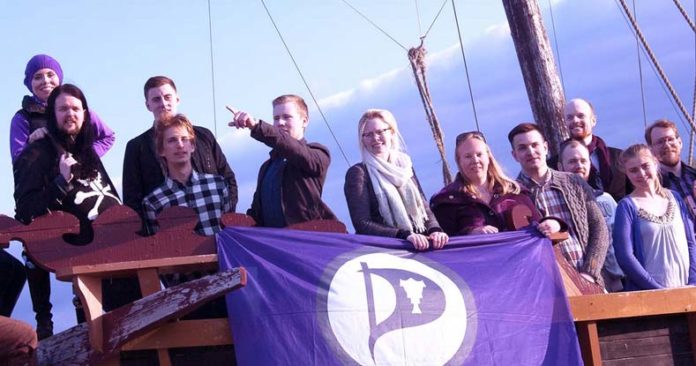
By Claire Bernish at thefreethoughtproject.com
In a country continuing to shirk the ordinary, Iceland’s Pirate Party — an amalgamation of anarchists, libertarians, and hackers, who want to ban digital surveillance — is predicted to win the country’s national elections this Saturday.
This collection of free-thinkers have upturned the traditional Western political paradigm and hopes to use online public polls to shape governmental policy and end all Internet spying.
Although the Pirate Party formed just four years ago, its popularity has skyrocketed — most likely for unconventional tactics aligning loosely with libertarianism — the promotion of privacy rights and personal freedoms, and simultaneous shrinking of Big Government.
Edward Snowden has been offered the safe haven of Icelandic citizenship should the Pirates likely victory come to fruition — which makes sense, given the party’s anti-establishment roots.
In fact, the Pirates have experienced astonishing success in a short time — taking the nation’s longstanding political traditionalists off-guard in the process — even the group’s founder, a programmer and former Wikileaks activist, is stunned.
Asked whether she expected the explosion of enthusiasm for the nascent Pirate Party — which now leads in public polls with 22.6 percent — founder Birgitta Jónsdóttir decisively told the Washington Post, “No way.”
But considering growing frustration with ever-increasing Western governments — and all of the surveillance programs, police state tactics, and chill on personal liberties — the rise of the Pirates, who describe themselves as neither right nor left but a radical mix of both, hardly seems too shocking.
“People want real changes and they understand that we have to change the systems,” Jónsdóttir asserted, “we have to modernize how we make laws.”
According to the Pirates’ website, “The Icelandic Pirate Party was founded on November 24th, 2012 based on the political ideology of the Swedish Pirate Party, which Richard Falkvinge founded in January 2006, to bring about internet copyright reform.”
Obviously, the message is resonating — one in five Icelanders now favor the Pirate Party, according to the Iceland Monitor.
Indeed, Iceland’s tendency toward the radical first became apparent in the fallout of the 2008 financial crisis. Instead of bailing out the Big Banks who’d sent untold numbers into economic ruin as the United States and European governments decided, Iceland jailed its crooked financiers. And although the move — which created additional hardship for years — wasn’t unanimously favored, the bold act opened the door for what happened next.
In April, the release of the notorious Panama Papers revealed Prime Minister Sigmundur Davíð Gunnlaugsson and his wife held stakes in an offshore secret investment company allowing them to profit enormously from the downfall of those Big Banks.
Though he denied all the allegations against him, dismissing the profiteering to, in essence, a years-old clerical error, Icelanders took to the streets en massed to protest the glaring conflict of interest. In fact, 6.6 percent of the country flooded streets around government buildings — a number equivalent in the U.S. to 21 million people, reports the Post — demanding Gunnlaugsson’s ouster.
“What would be the most natural and the right thing to do is that he resign as prime minister,” Jónsdóttir told the Guardian at the time. “There is great demand for that in society; he has totally lost all his trust and believability.”
Not long afterward, the embattled prime minister resigned. New elections were announced. But the people of Iceland had grown suspicious of political insiders and elites ruling the land, and worried electing candidates from traditional parties might yield the same corruption.
Enter the Pirate Party’s nontraditional platform.
“The distrust that had long been germinating has now exploded. The Pirates are riding on that wave,” University of Iceland political history professor, Ragnheithur Kristjánsdóttir, told the Post. “We’ve had new parties before, and then they’ve faded. What’s surprising is that they’re maintaining their momentum.”
Iceland has been the first of nations with Pirate Party presence to elect members to government positions — two Pirates serve as Members of Parliament. Ásta Guthrún Helgadóttir, one of the two and just 26-years-old, succinctly described what might be the key to the Pirate Party’s astounding success:
“We are not here to gain power. We are here to distribute power.”




